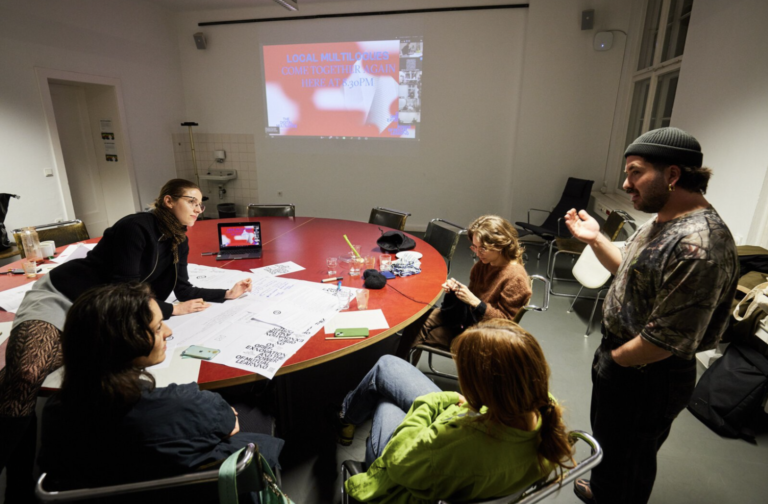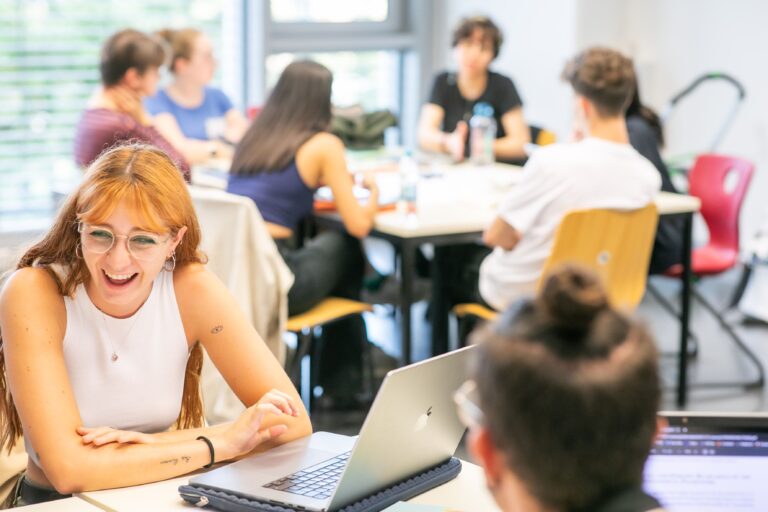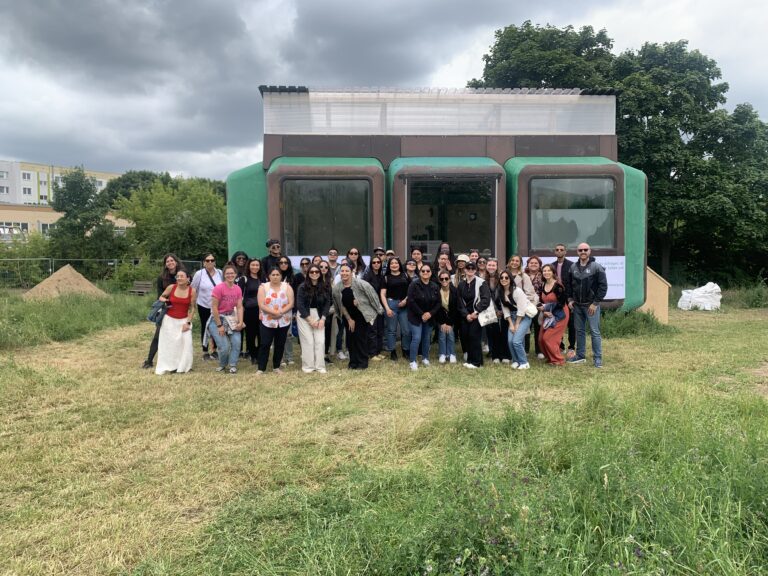

About BeCOIL
The BeCOlL project is designed to promote the innovative COlL concept among lecturers and to provide them with the support they need to plan and offer a COlL course.
COIL stands for “Collaborative Online International Learning” and enables students from different countries and cultures to participate in a collaborative course and work together online.
The BeCOlL project is part of the Berliner Qualitäts- und Innovationsoffensive (QIO) of the State of Berlin and includes nine Berlin universities. The goal is to make global competences accessible to all students and lecturers through collaborative projects. The BeCOlL coordinators at each participating university provide support for COlL projects and offer assistance in the design and implementation of COlL courses.
Objectives
- Establish and Expand COIL: We are dedicated to implementing and growing Collaborative Online International Learning (COIL) at Berlin’s universities.
- Standardize and Share Resources: We aim to standardize COIL formats and create a pool of shared resources.
- Enhance Student Participation in International Learning: COIL enables less mobile students to gain valuable international and intercultural competencies.
- Advance Instructor Skills: We help instructors enhance their digital and methodological skills within an international framework.
- Ensure Sustainable Integration: Our shared guidelines and quality standards lay the groundwork for the long-term integration of COIL.
- Utilize Synergies: Through teamwork and knowledge sharing, we strive to maximize the potential of our skills within and beyond our network.
- Support “Internationalization at Home”: The sustainable implementation of COIL is crucial for achieving a successful “Internationalization at Home” strategy.
Activities
The BeCOIL Team…
- Identifies and Addresses Educational Needs: We define and address further education needs related to COIL didactics and implementation.
- Resolves Administrative Challenges: We suggest solutions for administrative issues such as credit transfer and recognition of achievements.
- Implements and Shares COIL Practices: Coordinators implement COIL at their universities and actively exchange experiences.
- Prepares and Supports Students: We organize support and preparation for students before and during COIL, including an intercultural learning course and an intercultural serious game
- Curates Best Practices: We collect and share best practices to enhance COIL implementation.

What is COIL
COLLABORATIVE – Lecturers collaborate with counterparts from at least one other country to develop joint projects (often built into existing courses). Students collaborate with peers from another country on joint projects.
ONLINE – Interactions take place virtually in live sessions or in asynchronous groupwork. In-person meetings can also be built into the projects but are not a must.
INTERNATIONAL – Projects are developed with one or more partners from at least one other country and potentially even another discipline.
LEARNING – The learning that takes place is not limited to the course content. Through groupwork, interaction and purposeful activities students develop increased cultural competences and language skills.
What is COIL? An innovative teaching concept offering valuable learning experiences and creating connections across disciplines. Students from different countries work together on projects, develop their intercultural skills and gain valuable experience in international teamwork – essential key qualifications that enhance students’ employability.
The value and benefits of COIL: Participation in a COIL strengthens key skills such as cultural competence, foreign language skills and the ability to work in international teams. These key qualifications are essential for the global working place and make a significant contribution to increasing students’ employability.
An example of a COIL: COIL connects students and lecturers worldwide to create valuable teaching and learning experiences. Through virtual collaboration across borders, participants develop intercultural and digital skills. A concrete example of a COIL project can help to illustrate this innovative teaching concept and highlight its benefits.
The phases of a COIL: A COIL usually involves four phases: Icebreaker, Organization, Collaboration, and Reflection. In the first two phases, Icebreaker and Organization, participants get to know each other, clarify organizational details, and form mixed teams. In the third phase, Collaboration, students actively work together on a joint project. The fourth phase, Reflection, focuses on evaluating and analyzing the collaboration to deepen the learning experiences. This structured approach ensures effective cooperation and promotes exchange across national borders
Suggestions for developing a COIL: COIL projects can be implemented both within a specific subject area and in an interdisciplinary context. After successfully finding partners, lecturers develop the COIL project together by defining the framework, methods, and objectives of the collaboration. This structured approach enables effective cooperation and promotes exchange across disciplines and national boundaries.
Projects
Events
At the beginning of this 60-minute exchange session, Zehra Koyuncu from HTW Berlin presents the COIL “Businet Law Game“ which has been conducted by Prof. Dr. Michael Jaensch for several years. The event will be moderated by project coordinators from the BeCOIL team, which is represented at nine universities in
This 90-minute online course provides an introduction to the Collaborative Online International Learning (COIL) approach and outlines how you can incorporate digital and international elements into your teaching. This time we’ve invited Ana Carolina Vázquez Naranjo from the Tec de Monterrey (Mexico), who has carried out numerous COILs and who will present
At the beginning of this 60-minute exchange session, Prof. Dr. Antje Wilton-Franklin from the FU Berlin will give a keynote speech about her COIL course on Language and Ecology. Afterwards, you can exchange ideas with other Berlin teachers on the topic of COIL and develop plans for COIL courses. The
This 90-minute online course provides an introduction to the Collaborative Online International Learning (COIL) approach and outlines how you can incorporate digital and international elements into your teaching. BeCOIL and the Berlin Centre for Higher Education (BZHL) will jointly organise the event. Online-event, Thursday, November 16. 2023, 11 am to 12:30 pm
Im Rahmen des BeCOIL-Verbundprojekts bieten wir für Studierende, die aktuell einen COIL-Kurs (Collaborative Online International Learning) besuchen, oder generell an einem internationalen Austausch im Rahmen ihres Studiums interessiert sind, ein COIL-Begleitprogramm an. Als Lehrende von COIL-Kursen können Sie dieses kostenlose Angebot gerne mit Ihren Studierenden teilen. Wir starten am 2.
Digitalisierung im Bereich der Lehre bietet viele Möglichkeiten, um gemeinsam mit internationalen Dozierenden einzelne Lehreinheiten oder einen gesamten Kurs zu gestalten. Hier fällt häufig der Begriff COIL. Dieser steht für Collaborative Online International Learning. Zu Beginn dieser 60-minütigen Austauschrunde hält Prof. Dr. Stephanie Swartz von der HS Mainz einen Impulsvortrag
Aus dem Verbundprojekt Berliner Netzwerk Hybride Lehre Am Mittwoch, den 30.08.2023, 13:00-13:55 Uhr werden in zwei kurzen Impulsen didaktische Ansätze für die hybride Lehre vorgestellt. Sie erfahren mehr über die Konzepte Humanizing Online Lehre und Gestaltung von Gruppenarbeiten in hybriden Settings. Am Mittwoch 13.09., 13:00-13:55 wird die Reihe fortgesetzt mit einer Diskussion zur Wahl des
The 29th Annual Global, Cross-Sector Conference and Exhibition on Digital Learning and Training, 22nd – 24th of November, Berlin, Germany Overall 2023 Theme: The Learning Futures We Choose. “Will we decide the future we want for ourselves? Or will we be pushed into a dystopian system in which we have
European Association for International Education, 26th – 29th of September 2023, Rotterdam, the Netherlands The EAIE is the European centre for expertise, networking and resources in the internationalisation of higher education. The EAIE is a non-profit, member-led organisation serving individuals actively involved in the internationalisation of their institutions. The 33rd Annual



